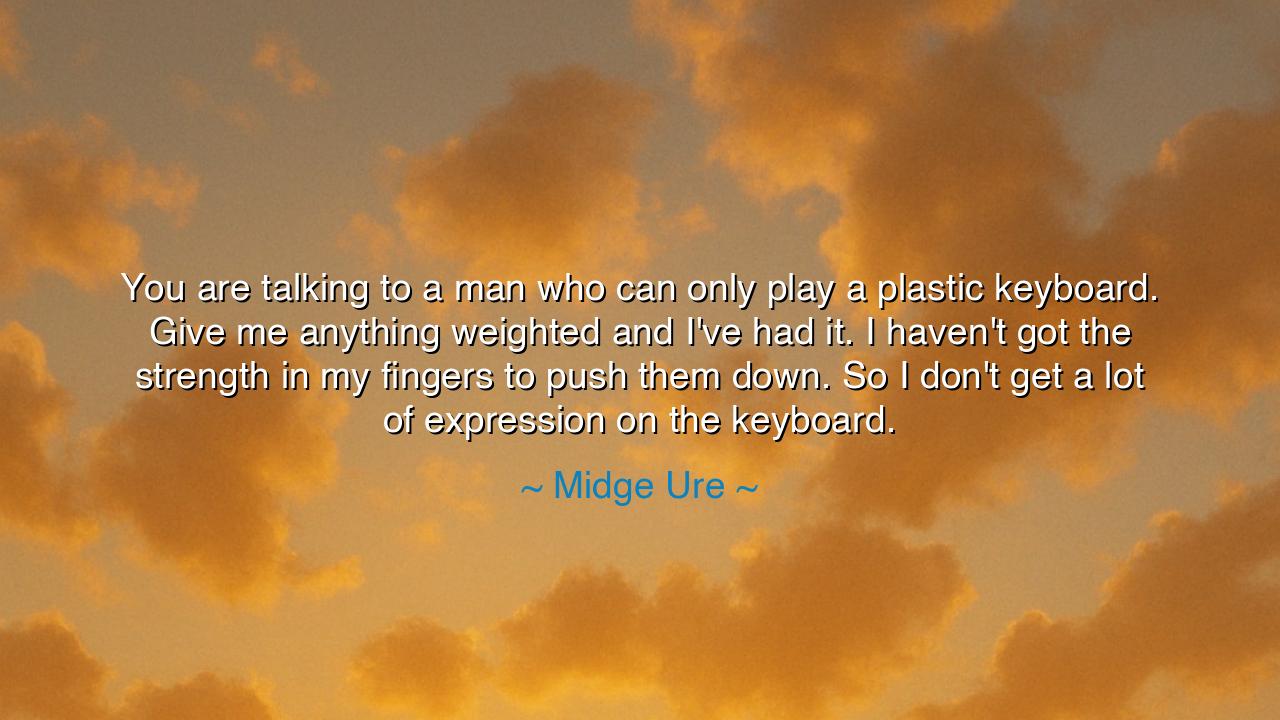
You are talking to a man who can only play a plastic keyboard.
You are talking to a man who can only play a plastic keyboard. Give me anything weighted and I've had it. I haven't got the strength in my fingers to push them down. So I don't get a lot of expression on the keyboard.






Hear the words of Midge Ure, spoken not in boasting but in humility: “You are talking to a man who can only play a plastic keyboard. Give me anything weighted and I've had it. I haven't got the strength in my fingers to push them down. So I don't get a lot of expression on the keyboard.” What at first seems a confession of weakness is, in truth, a window into the nature of human artistry. For he who admits his limitation also reveals his wisdom: that greatness is not found in possessing all abilities, but in making the most of the gifts at hand.
The origin of this saying lies in Ure’s journey as a musician, forged in the vibrant fires of the late twentieth century. Known for his role in Ultravox and for co-creating “Do They Know It’s Christmas?”, he was no stranger to innovation. Surrounded by instruments, he discovered that the traditional, weighted keyboard, with its demand for finger strength and technique, lay beyond his reach. Yet he did not surrender music. Instead, he turned to the plastic keyboard, an instrument less revered, but one that allowed him to express melody, rhythm, and emotion. Thus he teaches that artistry is not bound by convention, but by the ability to find one’s own way.
This truth resounds through history. Recall the tale of Beethoven, who, when struck by deafness, could no longer hear the music that once flowed so easily. Many would have abandoned creation, but he pressed his ear to the floorboards, felt the vibrations of sound, and composed works that shook the world. Beethoven, like Ure, showed that expression is not about perfect conditions but about the burning will to create. The instrument may limit, the body may falter, but the spirit finds new paths to bring forth beauty.
Thus, Ure’s statement is not about keys and fingers alone—it is about the broader struggle of all humanity. Each man and woman is given obstacles: a body that cannot do what others’ can, a mind that stumbles where others run, a life whose tools seem poor and unworthy. Yet the question is not, “What do you lack?” but, “What will you do with what you have?” The plastic keyboard becomes a symbol of adaptation, of resilience, of refusing to let weakness silence the song within.
In his humility, Ure also speaks of the limits of expression. He confesses that he cannot achieve the subtlety that a weighted instrument allows. Yet here lies another truth: even limited expression can move hearts when it is genuine. A simple note, played with sincerity, may strike deeper than a symphony performed without soul. For expression does not come only from the hand but from the heart that guides it. The listener hears not just keys but the spirit of the player.
The lesson for us is clear. Do not despise your limitations, nor envy the instruments you cannot play. Instead, cherish what lies within your reach, and master it until it becomes your voice. The world does not demand perfection; it demands authenticity. Even if your instrument is humble, even if your strength is small, let it carry your truth. For in embracing your own path, you may create a sound, a work, a life that none other could have forged.
Practical action is this: when faced with obstacles, adapt rather than despair. If one path is closed, carve another. If one tool is denied you, take up another and bend it to your purpose. Do not wait for perfect conditions, for they may never come. Like Midge Ure, take up the plastic keyboard of your life, and though others may see limitation, show them instead the power of resilience and creativity.
Thus, O listener, remember: greatness is not always found in the grand halls of mastery, but often in the quiet rooms where one learns to play imperfectly, yet truthfully. Strength is not always in the fingers, but in the will. Expression is not always in the instrument, but in the soul. This is the wisdom of Midge Ure, and the eternal teaching of all who turn limitation into song.






AAdministratorAdministrator
Welcome, honored guests. Please leave a comment, we will respond soon